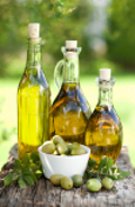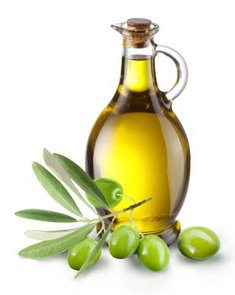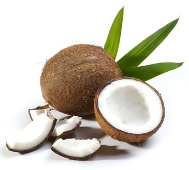Healthy Fats - Omega 3, 6, 7, 9 and Coconut Oil
Healthy fats include omega 3, omega 6, omega 7, omega 9 and saturated fats such as coconut oil. Contrary to what you may have heard, these fats are important to our health. Most fats should be unprocessed (unheated) and unrefined. There are only a few fats that should be heated (more about these fats below).

We eat more than enough of the unhealthy processed fats (including trans fats, refined polyunsaturated fats and too many saturated fats found in grain fed/factory farmed animal products.) What most of us lack is the antioxidant rich healthy fats and fatty acids found in unprocessed foods and oils.
Overview of Fats
All fats can be classified as either saturated, monosaturated or polyunsaturated fats. This describes the chemical make-up of each fat.
The more saturated the fat, the better it holds up under heat. Saturated fats also last longer (they are less delicate) than unsaturated fats and are usually solid at room temperature. Saturated fats can be found in animal products such as meat and dairy as well as coconut oil and palm oil.
Monosaturated fats include fats from olive oil and avocados.
Polyunsaturated fats are found in vegetable oils such as corn oil as well as nut and seeds.
Our bodies can manufacture some fats, but other essential fats must be obtained from our food.
The key to eating healthy fats is to eat traditional, unrefined fats in moderation and avoiding processed, refined vegetable oils.
The Essential Fatty Acids
Two important polyunsaturated fats are omega 3 and 6 essential fatty acids. These fats are considered essential because our body requires them, but cannot make them. We have to get them from our food on a regular basis.
Omega-3's play an important role in brain function as well as in growth and development. They also reduce inflammation and are believed to reduce the risk of chronic diseases such as heart disease, arthritis and cancer. They are highly concentrated in the brain and appear to be important for memory and performance. They are found abundantly in flax oil and walnuts as well as cold water fish such as salmon.
There are a few types of omega 3 fatty acids:
- ALA or alpha linolenic acid
- EPA or eicosapentaenoic acid
- DHA or docosahexenoic acid
- DPA or docosapentaenoic acid
ALA is found in plant foods such as flax, chia seeds, hemp seeds and walnuts.
EPA and DHA is created by marine microalgae which are consumed by fish. The most abundant amounts are found in oily fish such as herring, sardines, mackerel, salmon, halibut, tuna, krill and green-lipped mussels.
In general, these omega 3 fatty acids are believed to
- reduce inflammation
- help depression
- reduce arthritis
- reduce heart disease
- reduce strokes
- lower triglycerides
- help skin disorders
- help asthma
- reduce macular degeneration
While much of the research has been done on EPA and DHA from marine life, ALA also has many benefits.
ALA is the "parent" to EPA, DHA and DPA. In other words, ALA is converted to EPA, DHA and DPA in our bodies.
In addition, ALA by itself is believed to have the following benefits:
- reduces heart disease
- improves blood pressure
- acts as an anti-inflammatory
The lignans in ALA also are believed to offer the following benefits:
- reduces free radicals
- reduces breast cancer
- reduces menopausal symptoms
If you eat the Standard American Diet, it is likely that you get plenty of omega 6's from grain fed meat, processed oils and other processed foods. Our diet now includes huge amounts of processed oils that are extracted from plants and used for cooking or in prepared foods. These oils (such as processed corn oil, safflower oil, cottonseed oil, peanut oil, soybean oil) are primarily 6's.
While we need the 6's in our diets, we need them to be unprocessed and unrefined instead of the plentiful processed types of oils. Healthy omega-6 fatty acids can be found in borage, primrose oils and grass fed beef.
To learn more about how to get healthy essential fatty acids in your diet, see information on parent essential oils.
How To Consume
It is important to have a balance of these essential fats in our diet. The ideal ratio is 2.5:1 of omega 6's to 3's. The typical American diet which consists of many processed foods and oils typically is more like 20:1!
To get your ratio back to a more healthy 2.5:1, eat whole, unprocessed foods such as seafood, grass fed beef, pasteured eggs, whole grains, beans and other seeds. Reduce your intake of foods made with or cooked in processed vegetable oils such as baked goods and fried foods.
When using unrefined, cold pressed omega 3 and omega 6 oils, be sure to consume them without heating them. They can be used in salad dressings, drizzled on vegetables or taken as a supplement.
Grass Fed vs. Grain Fed Beef and Essential Fatty Acids
An interesting study was done in 2009 by Clemson University and the USDA. They compared grass fed beef with grain fed beef (most of which is on the market today.) They found that the grass fed beef provided a 2:1 ratio of omega 3 to omega 6 essential fatty acids as compared with the grain fed beef which was closer to a 4:1 ratio.
They also found that the grass fed beef
- higher in beta carotene
- higher in vitamin E
- higher in thiamin and riboflavin (B vitamins)
- higher in total omega 3's
- lower in saturated fats
Omega-9 Fatty Acids

These fatty acids are monounsaturated fats that are from a family of unsaturated fats commonly found in vegetable and animal fats. These fatty acids also are known as oleic acids or monounsaturated fats. They can often be found in sunflower, olive and nut oils. Unlike the essential fatty acids, these healthy fats are produced by the body, but are also beneficial when obtained in food.
Research has shown that omega 9 fatty acids, commonly referred to as monunsaturated, can help reduce the risk of cardiovascular disease and stroke. Because they have been shown to increase HDL ("good") cholererol and decrease LDL ("bad") cholesterol, they help eliminate plaque buildup in the arteries, which may cause heart attack or stroke. Sunflower oil is uniquely high in monounsaturated (omega 9) fat, as well as low in saturated fat and has no trans fat.
Remember, the key is to get these fats from unprocessed, unrefined oils.
Omega-7 Fatty Acids - More Healthy Fats
Most people have heard about the benefits of omega 3, 6 and 9. But there is another fatty acid, omega 7. It is found in sea buckthorn and macademia oils. This healthy fat has been found to be beneficial for skin, urogenital and digestive health. It contains palmitoleic acid, a monosaturated fatty acid which is a naturally occurring component of healthy skin and tissues. It is a highly effective antioxidant. It is also a strong emollient that soothes and moisturizes the skin and also promotes tissue regeneration.
This fatty acid has also been found to support the mucous membranes that line the digestive tract, the upper respiratory track and the vagina.
Remember, whether you eat foods with these oils or take a supplement, it should be unprocessed and unrefined.
Read more about the benefits of seabuckthorn oil
Healthy Saturated Fats
We have all heard that too many saturated fats are bad for us. We are told that we should avoid them. That is partially true. We should avoid a steady diet of grain fed meat because of the type of saturated fats that are in this type of meat.
Our bodies do need some healthy saturated fats, though. How can we get healthy fats that are saturated? We can eat grass fed beef and grass fed, organic butter. Another great low cost option is using coconut oil.
Coconut Oil - A Healthy Fat

Coconut oil is saturated fat that has been consumed in tropical places for thousands of years. Studies done on native diets high in coconut oil consumption show that these populations are generally in good health, and don't suffer as much from many of the modern diseases of western nations.
Coconut oil was once believed to be unhealthy because of its high saturated fat content. It is now known that the fat in coconut oil is unique and different from other fats and possesses many healthy benefits. It is now being recognized as a nutritious health food - one of the healthy fats.
What makes coconut oil different from all other oils, especially other saturated fats?
What Makes Coconut Oil Special
The difference is in the fat molecule. All fats and oils are composed of molecules called fatty acids. There are two methods of classifying fatty acids. The first is based on saturation. You have saturated fats, monounsaturated fats and polyunsaturated fats.
Another system of classification is based on molecular size or length of the carbon chain within each fatty acid. Fatty acids consist of long chains of carbon atoms with hydrogen atoms attached. In this system, you have short-chain fatty acides (SCFA), medium-chain fatty acids (MDFA), and long chain fatty acids (MCFA), also known as medium-chain triglycerides (MCT).
The vast majority of fats and oils in our diets, whether they are saturated or unsaturated come from animals or plants, and are made up of long-chain fatty acids (LCFA). Some 98 to 100% of all the fatty acids consumed are long-chain fatty acids (LCFA).
The size of the fatty acid is extremely important. Why? Because our bodies respond to and metabolize each fatty acid differently depending on its size. So the effects of MCFA in coconut oil are very different from those of LCFA more commonly found in our foods. The saturated fatty acids in coconut oil are predominately medium-chain fatty acids. Both the saturated and unsaturated fat found in meat, milk, eggs and plants (including most all vegetable oils) are made up of LCFA.
MCFA are very different from LCFA. They do not have a negative effect on cholesterol and help to protect against heart disease. MCFA help to lower the risk of both atherosclerosis and heart disease. It is primarily due to the MCFA in coconut oil that makes it a healthy fat and beneficial to our health.
There are only a very few good dietary sources of MCFA. By far the best sources are from coconut oil and palm kernal oils.
Much research on the nutritional and medicinal benefits of coconut oil has surfaced in recent years. Much of that research has been done by Dr. Mary Enig. Dr. Enig has classified coconuts as a "functional food," which provides health benefits over and beyond the basic nutrients. In other words, it is a healthy fat! She has specifically identified lauric acid as a key ingredient in cocnut products:
"Approximately 50% of the fatty acids in coconut fat are lauric acide. Lauric acid is a medium chain fatty acid, which has the additional beneficial function of being formed into monolaurin in the human or animal body. Monolaurin is the anti-viral, antibacterial, and antiprotozoal monoglyceride used by the muman or animal to destroy lipid coated viruses such as HIV, herpes, cytomegalovirus, influenza, various pathogenic bacteria including listeria monocytogenes and heliobacter pylori, and protozoa such as giaradia lambia. Some studies have also shouwn some antimicrobial effects of the free lauric acid."
Even though coconut oil is a healthy fat, it is important to use unrefined coconut oil to get the best and most nutritious oil.
Here are some ways to add unrefined coconut products into your diet.
Click here for more information on coconut oil and healthy fats.
Best Way To Consume Unprocessed Oils
Most oils are best consumed as unrefined or virgin oils. These healthy fats retain their nutrients and are much more healthy for our bodies. It's best to use these oils in salads or drizzled on food because heating them using high heat will damage the oils.
Eating grass-fed beef, butter, pasteured eggs and free range chicken help provide a better ratio of essential fatty acids.
Fish provides a good source of omega 3's.
If you need a supplement, use parent essential oils instead of fish oil. Parent essential oils contain both types of essential fatty acids in a form that your body can use.
Best Oils to Use in Cooking
Ghee (clarified butter)and coconut oil can be heated to high temperatures without damaging the oils. For this reason, it is recommended that when cooking, these oils should be used.
Both products can be found in health food stores and some grocery stores.
The next best oils to cook with are olive oil and macademia oil. These oils hold up better under heat than polyunsaturataed oils such as refined corn oil and refined safflower oil.
Oils Best NOT To Consume
It's best to avoid processed and refined oils. They are not healthy fats! These oils usually include refined corn oil, safflower oil, cottonseed oil, peanut oil, soybean oil, partially hydrogenated oils and trans fats. These oils are found in commercial baked goods and other processed foods. They do nothing for our health, and can have a negative impact on our bodies.





